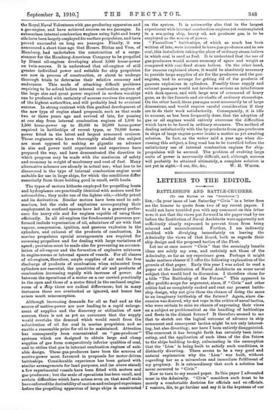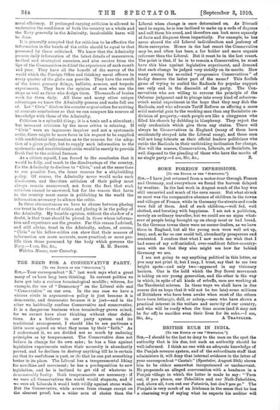LETTERS TO THE EDITOR.
BATTLESHIPS AND BATTLE-CRUISERS.
ao THE EDITOR OP TER "SPECTATOR.") SIR,—In your issue of last Saturday " Civis " in a letter does me the honour to quote from two of my recent papers. I would not have troubled you with any comment on this letter were it not that the views put forward in the paper read by me before the Institution of Naval Architects were apparently not sufficiently clearly expressed to prevent them from being misread and misunderstood. Further, I am indirectly credited with divulging immediately on leaving the Admiralty the views of that Board, both as regards their ship design and the proposed tactics of the Fleet.
Let me at once assure " Civis" that the seemingly lunatic ideas are solely my own, and certainly not those of the Admiralty, so far as my experience goes. Perhaps it might make matters clearer if I offer the following explanation of the genesis of that paper. Early this year I was asked to read a paper at the Institution of Naval Architects on some naval subject that would lead to discussion. I therefore chose for a title "The Battleship of the Future." This appeared to offer prolific scope for argument, since, if " Civis " and other critics had so completely racked and rent our present battle- ship design, why not give them the chance of doing the same to an imaginary battleship of the future ? Again, since dis- cussion was desired, why not rope in the critics of naval tactics, who were certain to miss no chance of expressing their views on a subject so problematical as the handling of battleships and fleets in the distant future P It therefore seemed to me that to sketch out the logical outcome of advance in ship armament and consequent tactics might be not only interest- ing, but also diverting; nor have I been entirely disappointed. The comment it has brought forth has certainly been inter- esting, and the application of such ideas of the dim future to the ships building to-day, culminating in the assumption that the 'Lion' is being built to satisfy such conditions, is distinctly diverting. There seems to be a very good and natural explanation why the 'Lion' was built, without regarding her as a miraculous and immediate fulfilment of my prophecy. It is extraordinary that such a solution has never occurred to " Civis."
Now to turn to my second paper. In this paper I advocated trust in the Admiralty. " Civis " considers such trust to be merely a comfortable doctrine for officials and ex-officials. I venture, Sir, to go further and say it is the keystone of our naval efficiency. If prolonged carping criticism is allowed to undermine the confidence of both the country as a. whole and the Navy generally in the Admiralty, incalculable harm will be done.
It is generally accepted that for criticism to be effective the information in the bands of the critic should be equal to that possessed by those criticised. We know that the Admiralty possess daily information of the latest details of inancenvres, tactical and strategical exercises, and also receive from the Lips of the Commanders-in-Chief the experience of each month and year. They have all the benefit of the survey of the world which the Foreign Office and thinking naval officers in every quarter of the globe can provide. They have the result of the latest gunnery firings, ballistic, armour, and torpedo experiments. They have the opinion of men who use the ships as well as those who design them. Thousands of brains work for them daily. All these and many other unique advantages we know the Admiralty possess and make full use of. Let " Civis" disclose his counter-organisation for arriving at accurate conclusions so that we can compare his sources of knowledge with those of the Admiralty.
Criticism is a splendid thing; it is a tonic and a stimulant ; but incessant criticism by the same critics is relaxing. If " Civis " were an ingenuous inquirer and not a systematic critic, there might be more force in his request to be supplied with confidential information as to the reasons for the adop- tion of a given policy, but to supply such information to the systematic and constitutional critic would be merely to provide fresh fuel to the critical furnace.
As a citizen myself, I am forced to the conclusion that it would be folly, and much to the disadvantage of the country, for the Admiralty to disclose to " Civis," and at the same time to our possible foes, the inner reasons for a shipbuilding policy. Of coarse, the Admiralty never would make such disclosures, and therefore criticism of their, policy must always remain unanswered, not from the fact that such criticism cannot be answered, but for the reason that harm to the country must ensue hi publishing to the world the information necessary to silence the critic.
In these circumstances we have to choose between placing our trust in the views of critics and placing it in the policy of the Admiralty. My humble opinion, without the shadow of a doubt, is that trust should be placed in those whose informa- tion and experience are the greater. For this reason I advised, and still advise, trust in the Admiralty, unless, of course, " Civis " or his fellow-critics can show that their sources of information are more accurate, more practical, or more pro- lific than those possessed by the body which governs the Navy.—I am, Sir, &c., R. H. Bacorr. Wolstort Manor, near Coventry.











































 Previous page
Previous page